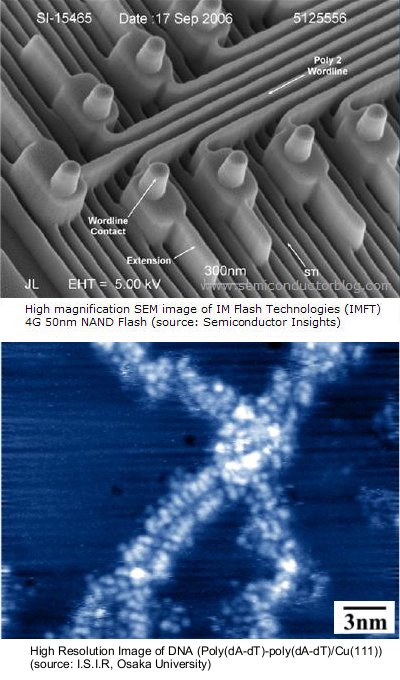From 2007.igem.org
(Difference between revisions)
|
|
| Line 8: |
Line 8: |
| | | | |
| | Furthermore, a demonstration system will be given by means of assembling all our parts to make the integrated system work in vivo. | | Furthermore, a demonstration system will be given by means of assembling all our parts to make the integrated system work in vivo. |
| - |
| |
| - | ==NOR Gate==
| |
| - | [[Image:ustc_nor gate.jpg|thumb|256px]]
| |
| - | [[Image:USTC_TruthTableNOR.png|203px]]
| |
| - |
| |
| - |
| |
| - | The NOR gate is a digital logic gate that implements logical NOR - it behaves according to the truth table to the left. A HIGH output (1) results if both the inputs to the gate are LOW (0). If one or both input is HIGH (1), a LOW output (0) results. In other words, it produces a value of false if and only if at least one operand is true. (from wikipedia)
| |
| - |
| |
| - | The draft to the right shows the NOR Gate we have determined ourselves to experimentally implement. It is an extract made from our weekly group meeting. As is shown in the draft, the RNA Polymerase cannot bind to the its target site.
| |
| - |
| |
| - | In the NOR gate, there are about 30 bp between the two operator. Their relative distance is so short that the competition is rather fierce between the respective specific bindings of the two repressors to their according operators, thus, only one repressor can succeed to bind. That is to say, when both of the two repressors are present, the output signal is at the similar level as that when there is only one repressor present. A NOR Gate is therefore framed up.
| |
| - |
| |
| - | ==NAND Gate==
| |
| - | [[Image:ustc_nand gate.jpg|thumb|256px]]
| |
| - | [[Image:USTC_TruthTableNAND.png|203px]]
| |
| - |
| |
| - | The NAND operation is a logical operation on two logical values, typically the values of two propositions, that produces a value of false if and only if both of its operands are true. In other words, it produces a value of true if and only if at least one of its operands is false. A LOW output results only if both the inputs to the gate are HIGH. If one or both inputs are LOW, a HIGH output results.(from wikipedia)
| |
| - |
| |
| - |
| |
| - | The draft to the right shows the NAND Gate we are destined to physically realize. It is also an extract made from an ordinary group meeting.
| |
| - |
| |
| - | In the NAND gate, positions with weak repression effect are re-selected for the two operators, making their relative distance much longer to make sure the DNA looping can be formed when both of the two binding proteins exist.
| |
| - |
| |
| - | ==NOT Gate==
| |
| - | [[Image:ustc_not gate.jpg|thumb|256px]]
| |
| - | [[Image:USTC_TruthTableNOT.png|150px]]
| |
| - |
| |
| - | The NOT gate is a digital logic gate that implements logical negation. It behaves according to the truth table to the left. A HIGH output (1) results if the inputs is LOW (0). If the input is HIGH (1), a LOW output (0) results. (from wikipedia)
| |
| - |
| |
| - | The draft to the right shows the NOT gate we plan to complete in the project.
| |
| - |
| |
| - |
| |
| - | The existence of repressor A fulfils the function of a simple NOT Gate. RNA Polymerase will not bind to the according RBS when the repressor has already bounds an operator. Not until the operator is relieved from the repressor will the RNA Polymerase come to work again.
| |
Revision as of 11:32, 25 October 2007
It is charming for biology scientists to implement a computer in biological organisms. Primarily, logic circuits made with biological materials can work in vitro [1]. More to the point, attempts to carry out unique logic gates in vivo have been reported. Here, our team has been trying to work out a systematic method to realize an extensible logical circuit in vivo.
As the basic elements of the logic circuits, AND, OR and NOT (or NAND, NOR and NOT) gates should be implemented in the first instance. Transcriptional regulation, which is widely found in biological organism, can be considered as a kind of switch. It serves as the basis of the logic gates in vivo. A negative transcriptional regulation is utilized as a NOT gate. The NOR and NAND gates are realized by installing two operator at the proper distance. All the gates are made on a 60~200-bp DNA fragments in this way.
To transmit signal between the gates is more complex in vivo than to do so in vitro. The signal messengers should be specific enough to avoid interference among them. Also, their life expectancy should be long enough to finish their work. Proteins are employed here to be the messengers. To possess enough binding specificity with DNA, proteins are screened with computational protein design and directed evolution. Highly qualified wires are thus obtained.
Furthermore, a demonstration system will be given by means of assembling all our parts to make the integrated system work in vivo.
